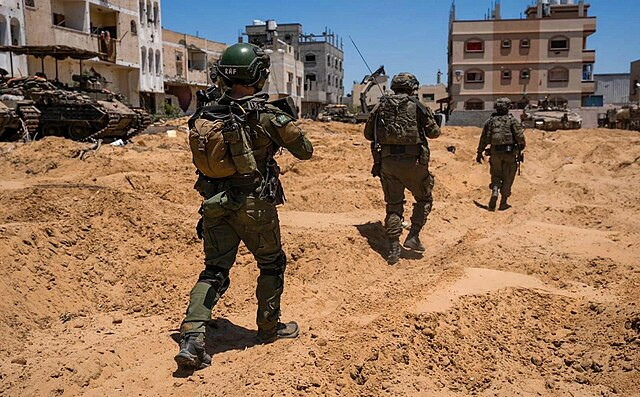Israel has drawn up plans for a large-scale ground invasion of Gaza, which would see Israeli forces occupying the enclave and imposing military rule, according to individuals familiar with the matter. The strategy, reviewed by Israel's Security Cabinet, could involve up to 50,000 troops and aims to dismantle Hamas control while consolidating authority over Gaza's civilian population.
Two sources who reviewed the classified war plans said they envision relocating Gaza's 2.2 million residents into a smaller "humanitarian zone" than previously designated, with soldiers controlling food distribution and limiting rations to the basic caloric intake required for survival. The sources spoke on condition of anonymity to discuss the classified proposals.
The plans were first published by the Israeli newspaper Haaretz and confirmed by NPR. In response, the Israeli military told NPR it would "not comment on future operational plans" and that it acts according to the directives of Israel's political leadership.
Since Israel ended a two-month ceasefire last week, it has resumed airstrikes on Gaza, pushing the death toll past 50,000, according to Gaza health officials. The military's intensified campaign has focused on Hamas political figures and infrastructure.
In a separate move, Israel's Cabinet approved a plan to assist Gaza residents in emigrating on what it termed a voluntary basis, echoing a previous proposal supported by former President Donald Trump.
Amid the escalating military preparations, Israeli Defense Minister Israel Katz issued a direct threat last week, stating that Israel might annex parts of Gaza if Hamas does not release remaining hostages. "The more Hamas continues its refusal, the more territory it will lose to Israel," Katz said Friday.
Lt. Gen. Eyal Zamir, Israel's newly appointed chief of staff, is reportedly leading efforts to prepare for broader ground maneuvers. "If there are not renewed hostage negotiations then the only alternative left is to resume the fighting," Eyal Hulata, former head of Israel's National Security Council, told CNN. "And there are serious plans."
The large-scale offensive under consideration would involve five Israeli divisions, amounting to roughly 50,000 troops, the sources said. Under the proposed scenario, Israeli forces would clear Hamas fighters from Gaza and occupy the territory to prevent a resurgence, potentially committing to years of counterinsurgency operations.
Former Israeli defense officials expressed differing views. Amir Avivi, former deputy commander of the Israeli military's Gaza division, argued, "You cannot destroy Hamas without controlling the entire Gaza Strip. Eventually you'll have to control everything."
Kobi Michael, a researcher at the Israeli Institute for National Security Studies, said: "In the meantime, pressure is being increased, forces are being gathered, plans are being updated, and efforts are being made to weaken Hamas's resistance and its ability to disrupt a potential ground offensive."
Amos Yadlin, former head of Israeli military intelligence, told NPR the military is refining its approach based on lessons learned in previous ground campaigns. "This means that this time, operations across the Gaza Strip will take place simultaneously, tunnels will be dealt with differently, and humanitarian aid will be carefully monitored to prevent Hamas from replenishing its stockpiles," Yadlin said. "This phase will include the occupation of parts of the Strip and the establishment of military rule, while maintaining civilian control and distributing food to Gaza residents, who will be concentrated in relatively limited areas. Wherever the (Israeli military) controls the Strip, it would be beneficial for food distribution to be generous."
However, public sentiment in Israel is split. A March 9 poll conducted by the Israel Democracy Institute found nearly three-quarters of Israelis support reaching a deal to free hostages rather than escalating military action. Recently released hostages and families of captives have warned that renewed combat could endanger the lives of the estimated 24 hostages still alive.
Within the Israeli military, growing fatigue among reservists presents additional challenges. Some reservists have publicly stated they will refuse to return to duty, citing exhaustion and disillusionment with Prime Minister Benjamin Netanyahu's government. Reserve Maj. Nir Avishai Cohen wrote in a Facebook post: "We have reached a point where only refusal and civil disobedience can bring about a change in the current situation and save the country."
American attorney Alan Dershowitz, a longtime ally of Netanyahu, criticized the government's recent priorities, telling Israel Army Radio: "It is a stupid thing to do to be prioritizing disputable controversial issues, when Israel is facing external threats that are so serious."
Retired General Israel Ziv warned about the long-term implications of further occupation. "Once you escalate you can find yourself at the end of the road, in the depth of swamp," Ziv told CNN. "And this is the risk that no one knows if it will work or not."
Meanwhile, diplomatic efforts by Egypt and Qatar to revive ceasefire negotiations continue. U.S. Secretary of State Marco Rubio and Netanyahu reportedly discussed Israel's military operations during a recent phone call, though details were not disclosed.




